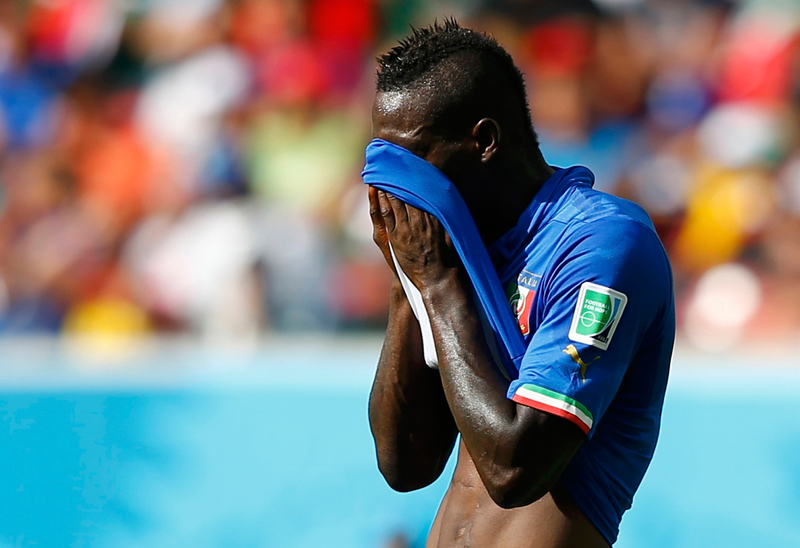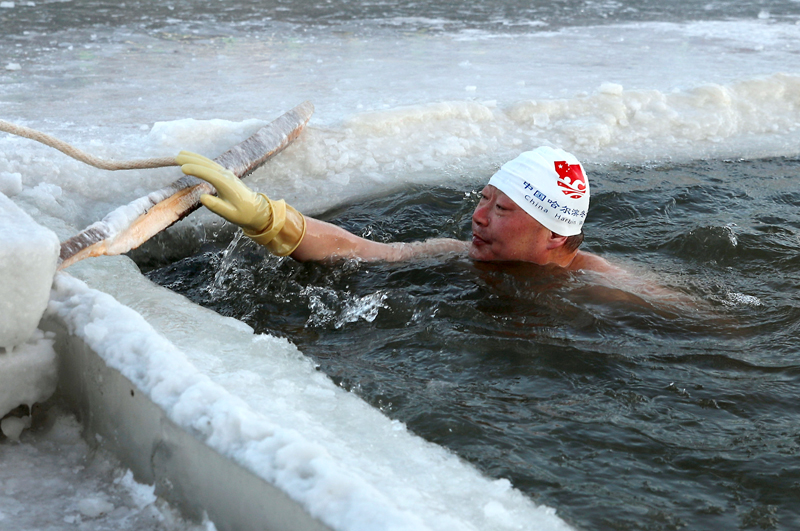African runners are genetically superior to white runners. Compared to whites, blacks are better suited for sports which involve short, explosive bursts of energy. Individuals from West Africa 'make' good sprinters, while people from East Africa are endurance types..
Those are strong statements. Many people believe them. And implicit in the statements are two inferences that usually remain unstated: (1) If blacks are physically exceptional, then they don't have to go through the mental turmoil of constructing a rigorous training programme; they can just let their bodies work their magic. (2) Whites are at a disadvantage. Since they're handicapped by bad genes, and therefore by their anatomy and physiology, they will never be able to compete equally with Africans..
Of course, believers in black 'super-genes' haven't been able to explain exactly how Africans have managed to corner the market on superior genetic material. When the Finns dominated the running world in the 1920s and again in the 1970s, no loud voices proclaimed that Finnish runners were genetically superior. Instead we pondered the merits of reindeer milk and called Lasse Viren a potential blood doper. When the Brits dominated middle-distance running in the 1950s and 1980s, there was no talk about brilliant British genetic material. Rather, we heard about British pluck and hard work. And when the Chinese women ran wild in 1993, it was because they were drugged, not because red-hot genetic material had fired up their performances. But now that Africans are running wild, the genetics lessons begin. Somehow, Providence has chosen to bless only African runners with top-quality DNA.
Opinions, not facts
It's time for a reality check. Although beliefs about genetic differences between African and non-African runners are widely held, it's important to remember that these beliefs are opinions - and nothing more. There's simply no scientific evidence to support the idea that African runners are genetically superior to European, North American, Asian, or South American athletes..
Why isn't there any evidence? At present, we don't even know WHICH genes are necessary for topflight performances! Since we don't know which genes are important, it's impossible to measure the relative frequencies of performance-enhancing genes in different groups of athletes. In addition, as explained at the end of this article, the available scientific research suggests that genetic factors are less important than non-genetic factors (including training and lifestyle) in determining performances..
Still, when Mr. Gebrselassie of Ethiopia rips through the 5K in a world-record 12:44 or Mr. Kiptanui from Kenya slashes the 3000-metre steeplechase mark, the familiar refrain begins again: Africans have the most slender upper bodies, the thinnest bones, the most rail-thin calves, the most tent-like lungs and the most reservoir-like, elephantine hearts - all because they have the optimal genetic make-ups. As a result, we don't need to concern ourselves too much with how the Africans train, or how they think about running, or what motivates them to run far ahead of everyone else. It's enough to believe that they were born with a vast talent which places them head and shoulders above the pack..
Why? Now ask them how?
Continuing to rely on the 'genetic explanation' for African superiority has negative consequences. After Africans win the vast majority of distance medals at the Atlanta Olympics - as they inevitably will - and then return to their continent, anyone saying that they won their hardware because of their genes is giving a huge insult to their untiring work and relentless motivation. And summoning up the hocus-pocus of genetic differences makes the running community less eager to actually learn something useful from the top African runners. You've probably noticed that people aren't exactly beating down the Africans' doors in order to understand how to train, even though the Africans have blown the socks off runners from the rest of the world. Instead, we continue to 'learn' from the same old coaches and gurus who have worked with and trained runners considerably slower than the current crop of Africans..
That's a bit strange. In the business world, we ask the top executives how they've managed to make their companies so successful. In the medical field, we ask the very best surgeons specific questions about their surgical techniques. But do we ask the Africans for training information? Why is it so much more convenient to believe that Africans have risen to the top because of inborn talent?
What the research actually says
There are just three relevant studies in the scientific literature that have examined physiological differences between Africans and non-Africans, and none of the three actually looked specifically at gene quality. That's no surprise; since, as mentioned, scientists don't actually know which genes code for endurance performance, they can't possibly determine whether Africans have a lockhold on superior genetic material. We don't know what 'superior genetic material' actually is..
So, instead of looking at actual genetic differences, scientists have made inferences about genes based on the physiological differences which they detect between blacks and whites. In a study carried out by Claude Bouchard and his group at Laval University in Quebec, 23 black male students and 23 Caucasian male students were compared. The black students hailed from Cameroon, Senegal, Zaire, the Ivory Coast and Burundi (mainly, that is, from the western and central parts of Africa), while the Caucasians were born in Canada and were of French descent. Both the Africans and Caucasians had an average age of 25, weighed about 154 pounds and were about 5'9' tall. All the students were sedentary at the time of the study..
No gene frequencies were measured, but Bouchard found that both groups had the same percentage (about 18 percent) of type IIb muscle fibres - the cells which are critically important for sprinting (so much for the idea that western Africans have muscles uniquely suited for high-speed running!). There were two key differences in muscle composition between whites and blacks: Caucasians had a higher percentage of type I cells (41 vs. 33 percent), while Africans checked in with more type IIa muscles (49 vs. 42 percent). As you know, type I fibres are great for prolonged, moderate-speed endurance performance, as in an event like the marathon, while IIa cells promote faster running times in shorter events like the 5K..
Although Africans had more IIa cells and fewer type I cells, we can't say that these differences are genetically based. For one thing, studies show that muscle fibre type is not tightly regulated by genes. Also, an individual's muscle-fibre composition can change over time. IIb fibres can probably become IIa cells, and IIa cells may be able to become type I fibres. Thus, it's impossible to say that the blacks' higher frequency of IIa fibres was a genetic thing..
The only other key difference between the Africans and Canadians was that blacks had higher concentrations of 'anaerobic' muscle enzymes, which are chemicals that spur the production of energy during short, intense running, whereas whites showed up with greater levels of 'aerobic' enzymes needed for continuous, endurance exercise. Again, there's no reason to conclude that these physiological differences are caused by genetic differences. The increased anaerobic-enzyme density in blacks might have simply been the result of their higher frequency of IIa cells..
The Laval scientists concluded that 'black individuals are, in terms of skeletal muscle characteristics, well endowed for sport events of short duration'. That's a somewhat shaky conclusion, since blacks and whites had exactly the same concentrations of IIb cells, the ones which are critical for sprinting, although it was true that blacks had higher amounts of anaerobic enzymes. As mentioned, it was impossible to say why the blacks' muscles were more tilted toward IIa fibres and away from type I cells. It might have been genetics, but it might have been the result of lifestyle, too..
What Tim Noakes found..
In a separate study carried out several years ago, Tim Noakes and his colleagues at the University of Capetown compared elite black vs. elite white South-African runners. Although both groups had similar 5-K times (about 13:45), the blacks were considerably faster in 10-K and half-marathon races. VO2max, running economy, maximal running velocity, training mileage and the percentage of type I muscle cells were exactly the same in the two groups, but there were some differences: (1) blacks ate more calories and carbohydrate per pound of body weight, compared to whites, (2) blacks trained considerably faster than whites, (3) blacks produced less lactate while running at race speeds, and (4) blacks were quite a bit shorter than whites (5'6' vs. 5'11') and weighed less (123 vs. 154 pounds)..
Note that only point four can be firmly pinned to genetics. Body height - although influenced by the environment - is fairly strongly determined by genes, and body weight tends to follow from height. Eating more calories and carbohydrate (point 1) is a lifestyle factor. Running at higher training speeds (point 2) often is part of an overall training philosophy that emphasises intensity rather than volume and is not necessarily coupled with a particular genetic constitution. Producing less lactate while running at high velocities (point 3) might simply be a long-term result of the more intense training carried out by blacks. Overall, Noakes' work provided no solid evidence that blacks were genetically different from whites.
The most revealing study on this topic was carried out by the renowned Swedish exercise physiologist, Bengt Saltin, who compared sedentary adolescent Kenyans, Kenyan high school runners and elite Kenyan runners with top-level Scandinavian runners. Saltin unearthed a number of important facts. First, relatively sedentary adolescent Kenyans had exactly the same aerobic capacities as sedentary Danish teenagers. If the Kenyans were really genetically superior, you would expect them to have higher VO2maxs than their Scandinavian counterparts (unless their 'superhuman' genes only revealed themselves in response to training).
Second, young Kenyan runners trained with astonishing intensity: About 50 to 60 percent of their total mileage was done at heart rates of 90 percent of maximum or higher! This was significantly higher than the Scandinavians' total and is much higher than anything European and American runners do generally.
Third, and following directly from point two, Kenyan runners - including the high schoolers - were more economical than the elite Scandinavians and also produced less lactate during high-speed running. This makes sense: one of the best ways to boost economy is to train fast, and the Kenyans have the corner on intense training. Also, fast training boosts the aerobic qualities of fast-twitch, type IIa muscle cells and lowers their lactate output, which probably explains why the Kenyans have lower lactate levels during strenuous running. Since high lactates are associated with fatigue, that's a very good thing!
The fourth finding - a critical one for our discussion of whether the Kenyans have a genetic edge - was that sedentary adolescent Kenyans had VO2max readings of 47 (the same as Scandinavians), very active (but non-training) Kenyan teenagers had VO2maxs of about 62, and seriously training high school Kenyan runners checked in with average VO2maxs of 65 to 68. Senior elite Kenyan runners have had their VO2max levels measured at 75 to 85. This progression in aerobic capacities from the mid-40s to high-70s and low-80s is exactly the same as the one observed in Americans (sedentary American youth have VO2max values in the 40s, while topflight runners like Salazar, Ryun, and Prefontaine were in the high 70s and low- to mid-80s). The progression in VO2max values is the same in Kenyans as it is in Americans! In addition, as high school Kenyans become elite senior runners, they increase their number of blood vessels per muscle cell and also enhance the concentrations of energy-producing aerobic enzymes inside their muscle cells. Those are natural responses to hard training and aren't necessarily caused by superior genes.
Calling all Kalenjins
Proponents of the genetic theory often point out that of the more than 35 tribal groups in Kenya, a single tribe - the Kalenjins - has produced most of the great runners (Lelei, Loroupe, Kiptanui, Keino, Kiprotich, Cheromei, Sang, Rono, etc.). The Kalenjins were traditionally a pastoral people who roamed the beautiful Rift Valley of Kenya with their cattle, so one might argue that genes which enhanced the ability to move long distances were 'selected' over evolutionary time. In contrast, members of another large Kenyan tribe, the Luo, have traditionally fished for a living and have produced few top runners..
However, political and social forces inside the country tend to favour the development of Kalenjins at the expense of other tribes. In spite of this, the recent trend in Kenyan running has been for non-Kalenjins (Ndeti, Kamau, Kinuthia, Masya, Osano, Asiago, Osoro, Karori, etc.) to become more prominent as time goes by, rather than for Kalenjins to increase their dominance. Most notably, the Kikuyu tribe, always a fine source of running talent (five-time world champion John Ngugi is Kikuyu), is beginning to produce more and more excellent runners, even though the Kikuyus have not interbred with Kalenjins and historically were not a nomadic people. In fact, running talent may be fairly equally distributed among Kenya's tribes. In other words, the Kalenjin-genetic hypothesis weakens once you take a closer look at what's really going on. How could so many different groups of non-interbreeding people produce top runners, if genetic factors were really the paramount factor?
So what's the real reason?
If genes aren't responsible, what accounts for the difference between African and non-African running? The African approach to training differs from the American-European method in a number of ways, including intensity (Africans usually train more intensely but with less mileage), the amount of hill training (there's no comparison here; the Africans are almost always working on hills), periodisation(Africans vary their training more - favouring big upswings and then gentle troughs; in fact, many Africans take a month or two away from running while their American and European peers continue to plug away without a break), and diet (Africans eat more carbohydrate, less protein, and less fat). Africans also benefit from a decade-long 'base' period - just running back and forth to junior school at moderate speeds - before they take up serious running, while Americans and Europeans tend to simply plunge into competition in more senior school without a prolonged, strength-boosting build-up..
Many of these factors have already been studied in scientific settings. We know that intensity is the most potent producer of fitness, yet American and European runners still preach the merits of high mileage. We know that hill training is better than flat-ground running, yet American and European runners often limit hill work to once a week. We know that the African diet is more conducive to elite performances, yet American and European runners continue to edge toward more protein and fat..
In addition, our book on periodisation - how to structure training over rather prolonged periods of time in order to produce the best-possible performances - is still empty, or - rather - it's filled with lots of theory and little hard data, so it's perhaps in this area that the Africans can be our pragmatic teachers. It's clear that the African pattern of very hard work followed by very thorough rest fits better with human physiology than the American and European scheme of hard work - and then more hard work. The human body always reaches optimal functioning more readily when stress is combined with recovery, rather than when stress is continuously kept at a taxing level..
The bottom line?
Rather than speculating about superior genes, let's ask world champions like Mr. Tergat and Ms. Tulu what they are doing in January, March, July and September, and throughout the whole year. Chances are good that we'll pick up some useful information from them. Let's face it, there's no evidence that Africans have a lock on the genes needed for world-record running performances. After all, we don't even know what those genes are, and (as the following note explains) most research has suggested that training and lifestyle - not genetic factors - account for more of the variation in athletic performances. So let's give the Africans credit for earning their world-beating performances. And let's learn from them about how to perform at the best-possible level..
Research footnote
Could geneticists ever demonstrate convincingly that Kenyans are genetically superior? Of course! They would simply have to identify the genes which are important for endurance performance and show that those genes are more prevalent in Kenyan runners..
This can't be done at present. We simply don't know which genes are critical for enhancing performance, so we can't measure their frequencies in Kenyans, Americans, Slovenians, Siberians, or anyone else. Identification of such genes will probably happen, but not for another five to 10 years at least..
In the meantime, we might try to look at genetic differences indirectly - by examining physiological differences between Kenyans and non-Kenyans and then making inferences about genetics. For example, we might compare Kenyan and American five-year-olds, before either group has had a chance to do any training (even a smattering of training might make one group look better than the other). If we found no physiological differences, it would appear that the Kenyans did not enjoy an inherent genetic advantage..
However, even if the Kenyans were fitter, it would be hard to argue convincingly that the difference was genetic. After all, the Kenyan kids would probably eat differently than the Americans (fruits and vegetables versus Snickers bars), their everyday activity patterns would be different (Kenyans would gather wood and haul water while Americans would watch the box), and many of the Kenyan youngsters would probably be residing at altitude. All of these factors - diet, habitual activity and altitude residence - can have a strong impact on physiology, so the Kenyan kids' edge might have nothing to do with genetics..
How about training previously sedentary groups of Kenyans and Americans of various ages and then observing their responses to training? Of course, we would try to make everything as similar as possible: Americans and Kenyans would have the same training history and be the same weight, height, age, etc. If the Kenyans improved by 30 percent in response to our training programme while the Americans went up by only 15 percent, wouldn't that show that Kenyans had special genes which boosted their responsiveness to training?
Well, no. Again, the Kenyan difference might simply be due to prior lifestyle factors such as diet, altitude, daily activity, etc. The bottom line is that you can't look at Kenyan world-beating performances and say 'Aha! It's genetic!' Too many other factors can account for performance differences. As the great geneticist Claude Bouchard, Ph.D., says: 'There's currently no evidence that the Kenyans are genetically superior.'










